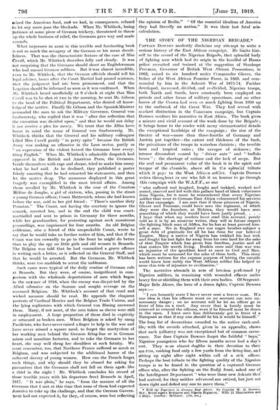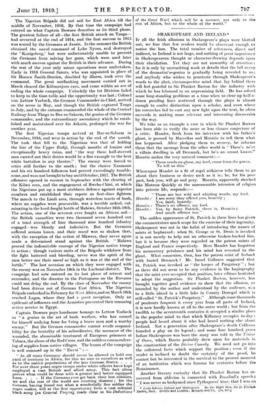THE STORY OF THE NIGERIAN BRIGADE.* CAPTAIN DOWNES modestly disclaims
any attempt to write a serious history of the East African campaign. - He limits him- self to the record of the Nigerian Brigade, that splendid body of fighting men which had its origin in the handful of Hausa police recruited and 'trained at the suggestion of Stanhope Freeman, Governor of British West - African Possessions, in 1862, raised to six hundred under Cemmander Glover, the father of the West African Frontier Force, in 1863, and com- manded by him in the Ashanti War of 1873-74. Further developed, increased, divided, and re-divided, Nigerian troops, both North and South, have constantly been employed on
patrols and other forms of military operations, and no other forces of the Crown had sun so much fighting from 1900 up
to the outbreak of the Great War. They had served with marked . distinction in the Cameroon campaign, but Captain Downes confines his narrative to East Africa. The book gives a minute and vivid account of the work done by the Brigade ; it brings home to the reader with many circumstantial details the exceptional hardships of the campaign : the size of the theatre of war—more than three-fourths of Germany and Austria put together—the extent and thickness of the bush, the privations of the troops in waterless districts ; the terrible heat and tropical rains ; the ravages of sickness ; the intense discomfort caused by " driver ants " and " buffalo
beans" ; the shortage of rations and the lack of maps. But the real and permanent value of the book is in the spirit and temper of the chronicle, above all in the splendid tribute
which it pays to the West African soldier. Captain Downes wiites throuLhout as one who felt it an honour to go through this campaign with the W.A.F.F., as one
" who suffered and laughed, fought and trekked, worked and rested, starved and fed with this gallant band of black volunteers from Nigeria, for it must be remembered that every Nigerian soldier that went to German East Africa volunteered his services for that campaign. I am sure that if those pioneers of Nigeria, Glover and Freeman, could have seen the regiment, of which they were the founders, at Mahiwa, they would have seen something of which they would have been justly proud. . . . I hope that when my readers" have read this account; poorly told as it is by an amateur writer, they will in future respect the fighting black man of Africa, for he has at least proved him- self a man. We in England owe our negro brother-subject 'a great debt of gratitude for all he has done for our beloved Empire. Many a native of Nigeria has trekked his last trek and fought his last fight far away from his own land for the sake of that Empire which has given him freedom, justice and all that makes life worth living.. Ruskin once said that war was an injustice of the ignoblest kind at once to God and Man, which must be stemmed for the sake of them both. This story has been written for the express purpose of letting the outside world know how nobly the West African soldier has helped to stem this tide of injustice to civilization."
The narrative abounds in acts of heroism perfcrmed .ly Nigerian soldiers, in remaining with wounded_ officers under heavy fire or shielding them with their own bodies. CIf Sergeant- Major Belo Akure, the hero of a dozen. fights, Captain Downes says :- " I can honestly state I have never seen a braver man.
one idea is that his officers must on no account run into un- necessary danger ; on no account will he let an officer go in front of him on a road. Any cover that is handy must be reserved to conceal the officers, even if he himself must lie down in the open. I have seen him deliberately get in front of a European so that if any one should be hit it would be himself."
The long list of decorations awarded to the native rank-and- file,. with the records attached, given "id an 'aPpendix, shows that such gallantry was not exceptional but of coniinon occur- rence. Nor does Captain Downes forget the faithful " boys," Nigerian youngsters who for fifteen months never had a day's
rest. They ware almost doglike in their devotion to their masters, cooking food only a few yards from the firing-line, ani
sitting up night after night within call of a sick officer. Perhaps the best tribute to the fighting quality of the Nigerian troops is to be found in the question of a captured German officer who, after the fighting on the Rufiji front, asked one of the Intelligence Department " who were these new Askaris that had arrived, for they neither advanced nor retired, but just sat down tight and defied any one to move them."
.• With the. Nigerians in tirernsan Bag Africa. By Captain W. D. Downes, MX, Royal Su sex RItIment and Nigeria Ittliment. With "31 Illuatiations fad Maps. London : Methuen. 115e. net.]
The Nigerian Brigade did not sail for East Africa till the middle of November, 1916. By that time the campaign had entered on what Captain Downes describes as its third phase. The greatest failure of all—the first British attack on Tanga— had occurred at the end of 1914, and the first success in 1915 was scored by the Germans at Jassin. In the summer the British obtained the naval command of Lake Nyasa, and destroyed the ' Konigsberg,' but were unfortunately unable to prevent the Germans from salving her guns, which were used later with much success against the British in their advance. During the rest of the year only minor operations were undertaken. Early in 1916 General Smuts, who was appointed in place of
Sir Horace Smith-Dorrien, disabled by illness, took over the command. The great outflanking movement carried out in
March cleared the Kilimanjaro area, and came within an ace of ending the whole campaign. Unluckily the 1st Division failed to keep to the time-table and the opportunity was last ; Colonel von Lettow Vorbeck, the German Commander-in-Chief, arrived on the scene in May, and though the British captured Tanga in July, and by the autumn commanded the whole of the Central Railway from Thnga to Dar-es-Salaam, the genius of the German commander, and the extraordinary ascendancy which he estab- lished and maintained over his Askaris, prolonged the war for another year.
The first Nigerian troops arrived at Dar-es-Salaam in December, 1916, and were in action by the end of the month. The task that fell to the Nigerians was that of holding the line of the Upper Rufiji, through months of famine and exceptionally heavy rains, and " the way these half-starved men carried out their duties would be a fine example to the best white battalion in any theatre." The enemy were forced to retire still further to the south ; but the elusive Naumann and his six hundred followers had proved exceedingly trouble- some, and were not brought to bay until October, 1917. The British offensive opened in earnest in September with the clearing of the Kilwa area, and the engagement of Bweho-Chini, at which the Nigerians put up a most stubborn defence against superior numbers and established their repute as first-clans fighters.
The march to the Lindi area, through waterless tracts of bush, where no supplies were procurable, was a terrible ordeal, cul- minating in the hard-fought battle of Mahiwa, October 16th-18th. The action, one of the severest ever fought on African soil—
the British casualties were two thousand seven hundred out of a total strength of four thousand nine hundred infantry engaged—was bloody and indecisive. But the Germans suffered serious losses, and their moral was so shaken that, with the exception of the action of Mkwera, they never again made a determined stand against the British. " Mahiwa proved the indomitable courage of the Nigerian native troops in action ; though various units of the Brigade withdrew from the fight battered and bleeding, never was the spirit of the men better nor their moral so high as it was at the end of the battle." The last occasion on which they were engaged with the enemy was on November 18th in the Luchemi district. The campaign had raw entered on its last phase of retreat and surrender, and the disaster to the Portuguese on the Rovuma could not delay the end. By the close of November the enemy had been driven out of German East Africa. The Nigerian Brigade embarked in February for West Africa,and on March 16th reached Lagos, where they had a great reception. Only an epidemic of influenza and the Armistice prevented their resuming active service in Egypt.
Captain Downes pays handsome homage to Lettow Vorbeck as " a genius in the art of bush warfare, who has earned
for himself undying fame for being a brave man and a worthy enemy." But the German commander cannot evade responsi- bility for the brutality of his subordinates, the massacre of the wounded, the abominable treatment of European prisoners at Tabora, the abuse of the Red Cross, and the ruthless commandeer- ing of supplies from native villages. The lesson of the campaign is well summed up in the " Envoi " :- " At all costs Germany should never be allowed to hold one yard of territory in Africa, for this we owe to ourselves as well as to the native populations of the late German States. . . . For over three years negro troops under white officers have kept employed a vast British and allied army. This fact alone proves what could be done with a greater and better equipped
force. . . If the Germans ever get back their lost colonies, we and the rest of the world are courting disaster ; for the German, having found out what a wonderfully fine soldier the negro makes, will at the first opportunity form a vast colonial black army [es General Freytag made clear in his Deli/Idioms of the Great Wail which will be a menace, not only to the rest of Africa, but to the whole of the world."







































 Previous page
Previous page